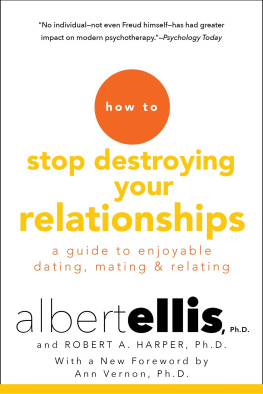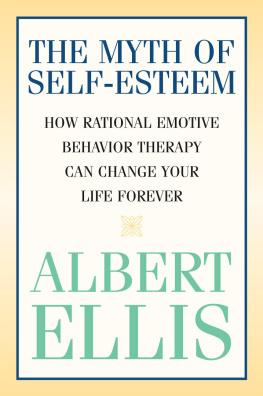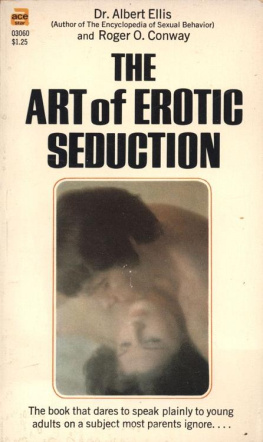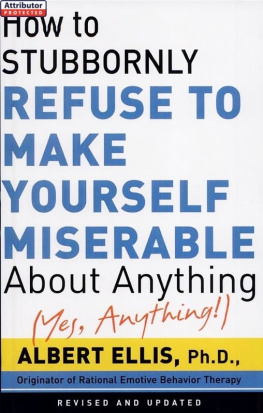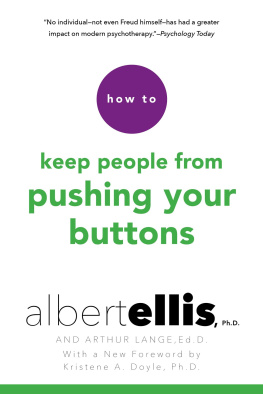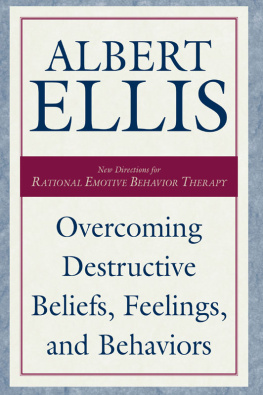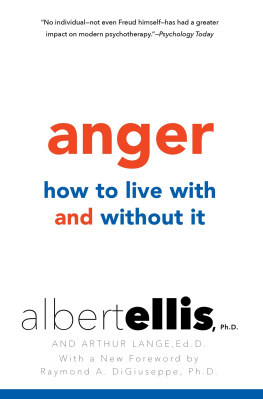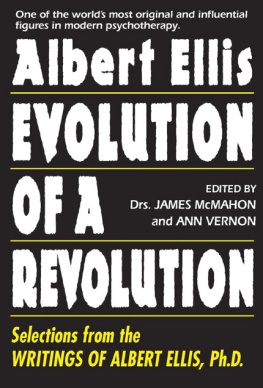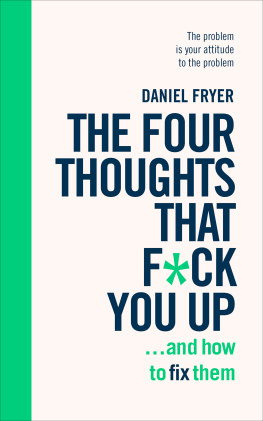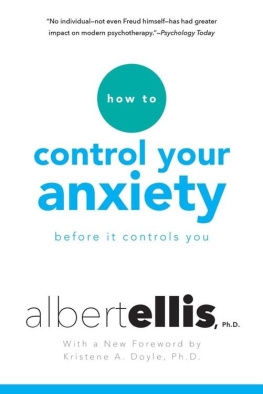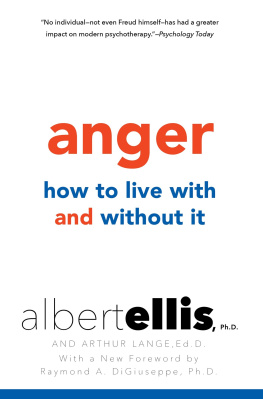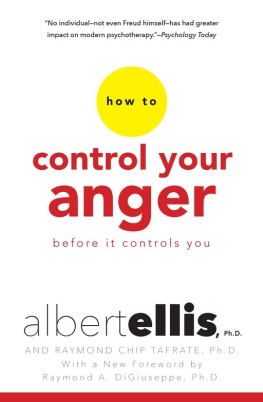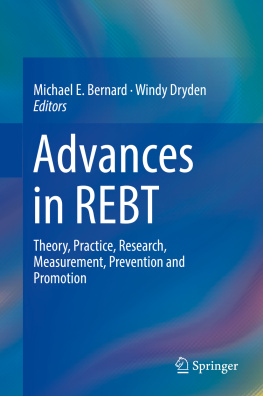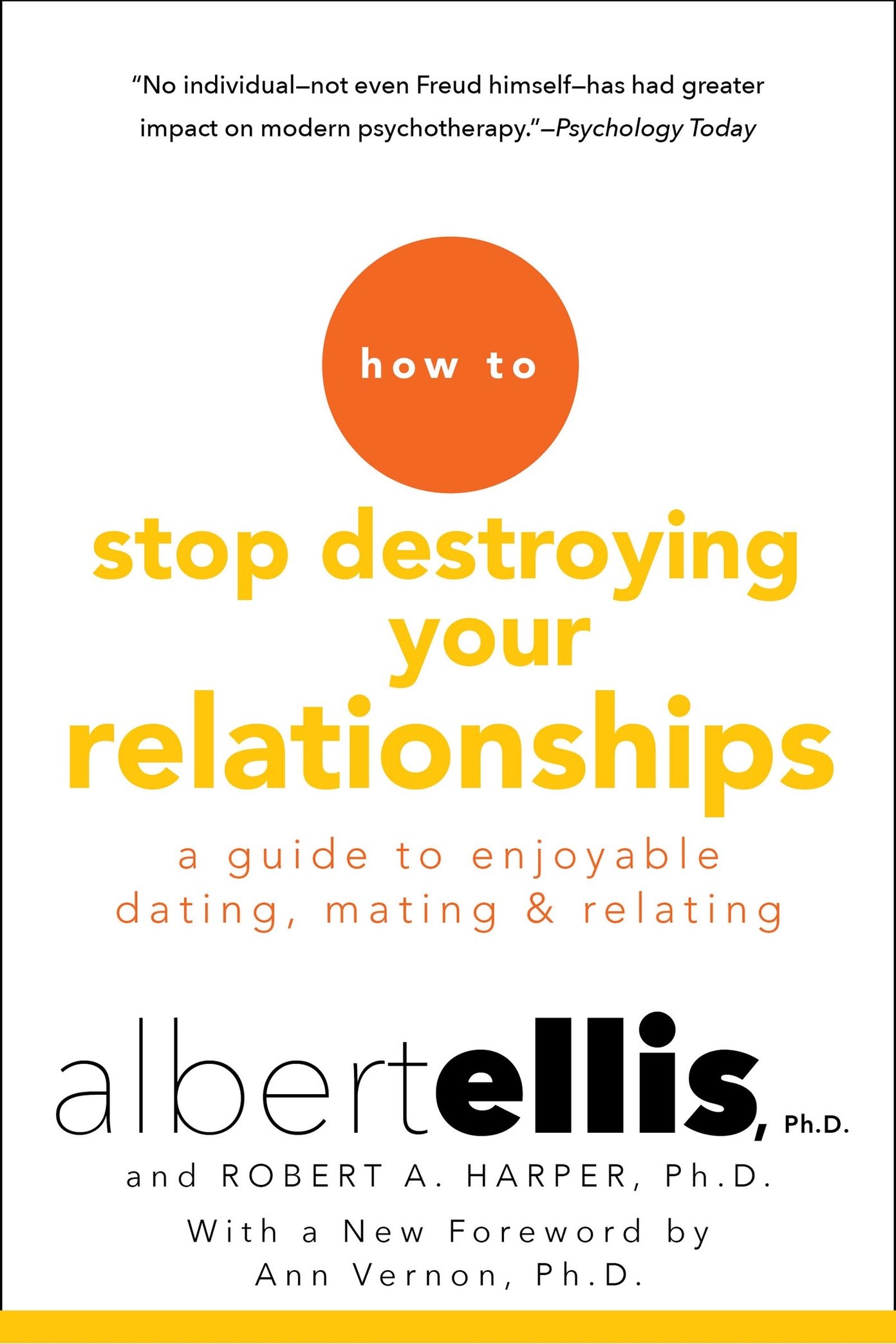About the Authors
Albert Ellis, Ph.D., founded Rational Emotive Behavior Therapy (REBT), the pioneering form of the modern Cognitive Behavior therapies. In a 1982 professional survey, Dr. Ellis was ranked as the second-most-influential psychotherapist in history. His name is a staple among psychologists, students, and historians around the world. He published over seven hundred articles and more than sixty books on psychotherapy, marital and family therapy, and sex therapy. Until his death in 2007, Dr. Ellis served as president emeritus of the Albert Ellis Institute in New York, which provides professional training programs and psychotherapy to individuals, families and groups. To learn more, visit www.albertellis.org .
Robert A. Harper, Ph.D., taught psychology and sociology at Wagner College from 1943 to 1945. Harper was interested in conformity in social behavior as indicated in his 1942 dissertation, An exploratory questionnaire study of conforming and nonconforming behavior, which he completed at Ohio State University. His work was interdisciplinary, drawing from the work of Floyd Allport, considered by some to be the founder of modern social psychology, and Walter Reckless, the sociologist who supervised Harpers dissertation.
Before coming to Wagner, Harper taught at Ohio State and Kent State universities and was an area analyst in Ohio for the War Manpower Commission (created by President Roosevelt in 1942). According to the 194546 Wagner College catalog, he resigned to enter war work. For a year, he worked as a psychiatric social worker in the U.S. Army.
After leaving Wagner and the army, he became a prominent marriage and family counselor. He wrote several books with Albert Ellis, the founder of Rational Emotive Behavior Therapy including Creative Marriage (1961), A Guide to Successful Marriage (1975), and A Guide to Rational Living (1961, with revisions in 1975 and 1998), among others. His Psychoanalysis and Psychotherapy: 36 Systems (1959) was one of his most influential books. His obituary was published in American Psychologist in 2004 (vol. 59, no. 6, p. 562).
Ann Vernon, Ph.D., Sc.D., PPC, is president of the board of trustees of the Albert Ellis Institute, one of the first diplomates of the institute, a member of the International Training Standards and Review Committee of the AEI, a member of the Board of Consulting Advisors for the Journal of Rational-Emotive Cognitive-Behavior Therapy , and former director of the Midwest Center for REBT. In addition, she was selected by the American Psychological Association to do a counseling video demonstration entitled Rational Emotive Behavior Therapy Over Time: Psychotherapy in Six Sessions.
Dr. Vernon is recognized as the leading international expert in applications of RE&CBT with children and adolescents and has written numerous books, chapters, and articles about counseling this population, including Thinking, Feeling, Behaving: An Emotional Education Curriculum , What Works When with Children and Adolescents: A Handbook of Individual Counseling Techniques , The Passport Program , and More What Works When with Children and Adolescents.
Dr. Vernon is professor emerita, University of Northern Iowa, and was in private practice for many years. She currently conducts RE&CBT training programs in the United States and various other parts of the world. Ann Vernon lives in Tucson, Arizona, from October to mid May; from mid May to early October she lives in Wisconsin.
Suggested Reading
The following references include a number of REBT and Cognitive Behavior Therapy publications which may be useful for self-help purposes. Many of these materials can be obtained from the Albert Ellis Institute, 145 East 32nd Street, New York, NYby phone (212-53 5-0822), fax (212-249-3582), or by email (orders@rebt.org). Check out the publications on the Albert Ellis website, www.AlbertEllis.org .
Alberti, R. and Emmons, R. (1995). Your Perfect Right. 7th ed. San Luis Obispo, Cal.: Impact Publishers. Original ed., 1970.
Barlow, D. H., and Craske, N. G. (1994). Mastery of Your Anxiety and Panic. Albany, New York: Graywind Publications.
Beck, A. T. (1988). Love Is Not Enough. New York: Harper & Row.
Broder, M. (2002). Can your relationship be saved? How to know whether to stay or go. Atascadero, CA: Impact.
Burns, D. D. (1999). Feeling Good. New York: Morrow.
Dryden, W. (1994). Overcoming Guilt! London: Sheldon Press.
Dryden, W., and Gordon, J. (1991). Think Your Way to Happiness. London: Sheldon Press.
Ellis, A. (2001). How to Stubbornly Refuse to Make Yourself Miserable About AnythingYes, Anything! New York: Citadel Press.
_____ (2000). How to Control Your Anxiety Before It Controls You. New York: Kensington Publishing.
_____. (1999). How to Make Yourself Happy and Remarkably Less Disturbable. Atascadero, Cal.: Impact Publishers.
_____. (2001). Feeling Better, Getting Better, and Staying Better. Atascadero, Cal.: Impact Publishers.
_____. (2001). Overcoming Destructive Beliefs, Feelings, and Behaviors . Amherst, N.Y.: Prometheus Books.
Ellis, A., and Becker, I. (1982). A Guide to Personal Happiness. North Hollywood, Cal.: Melvin Powers.
Ellis, A., and Crawford, T. (2002). Making Intimate Connections. Atascadero, Cal.: Impact Publishers.
Ellis, A., and Harper, R. A. (1997). A Guide to Rational Living. North Hollywood, Cal.: Melvin Powers.
_____. (1961). A Guide to Successful Marriage . North Hollywood, Cal.: Melvin Powers, Inc.
Ellis, A., and Knaus, W. (1977). Overcoming Procrastination. New York: New American Library.
Ellis, A., and Lange, A. (1994). How to Keep People from Pushing Your Buttons. New York: Carol Publishing Group.
Ellis, A. and Powers, M. G. (2000). The Secret of Overcoming Verbal Abuse . North Hollywood, Cal.: Melvin Powers.
Ellis, A., and Tafrate, R. C. (2000). How to Control Your Anger Before It Controls You. New York, N.Y.: Citadel Press.
Ellis A., and Velten, E. (1998). Optimal Aging: Get Over Getting Older. Chicago: Open Court Publishing.
_____. (1992). When AA Doesnt Work for You: Rational Steps for Quitting Alcohol. New York: Barricade Books.
FitzMaurice, K. E. (1997). Attitude Is All You Need. Omaha, Neb.: Palm Tree Publishers.
Freeman, A., and DeWolf, R. (1989). Woulda, Coulda, Shoulda. New York: Morrow.
Glasser, W. (1999). Choice Theory. New York: Harper Perennial.
Hauck, P. A. (1991). Overcoming the Rating Game: Beyond Self-LoveBeyond Self-Esteem. Louisville, K.Y.: Westminster/John Knox.
Lazarus, A. (2001). Marital myths revisited: Afresh look at two dozen mistaken beliefs about marriage . Atascadero, CA: Impact.
Lazarus, A., and Lazarus, C. N. (1997). The 60-Second Shrink. Atascadero, Cal.: Impact Publishers.
Lazarus, A., Lazarus, C., and Fay, A. (1993). Dont Believe It for a Minute: Forty Toxic Ideas That Are Driving You Crazy. Atascadero, Cal.: Impact Publishers.

